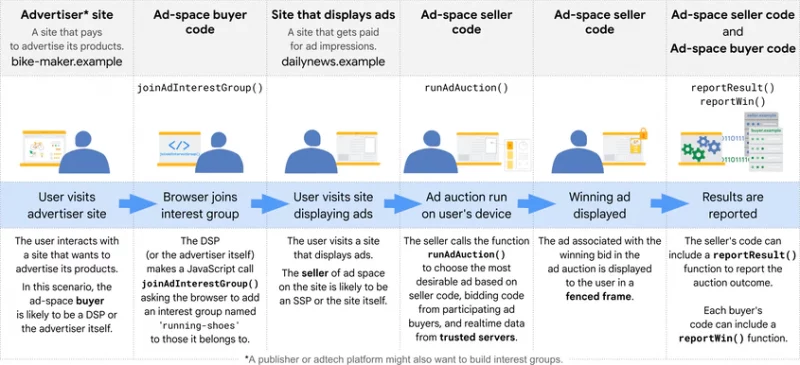Google begins testing FLEDGE API on AdSense
The new API uses interest groups instead of cookie-based tracking for both audiences and remarketing.
FLEDGE is a Privacy Sandbox proposal for remarketing and audiences. It’s designed so that it can’t be used by third parties to track user browsing behavior across websites. Google will begin testing the API on AsSense accounts on August 28.
What is FLEDGE. The API uses interest groups to enable sites to display ads they believe are relevant to their users. According to Google, when a user visits a website that wants to advertise its products, an interest group owner (such as a DSP working for the site) can ask the user’s browser to add membership for the interest group. The group owner (in this example, the DSP) does this by calling the JavaScript function navigator.joinAdInterestGroup(). If the call is successful, the browser records:
- The name of the interest group: for example, ‘custom-bikes’.
- The owner of the interest group: for example, ‘https://dsp.example’.
- Interest group configuration information to enable the browser to access bidding code, ad code, and real-time data, if the group’s owner is invited to bid in an online ad auction. This information can be updated later by the interest group owner.
Later when a user visits a website that sells ad space, the seller for the website can use FLEGDE to run an ad auction to select the most appropriate ads to display to the users. Bidding is only run for the interest groups the user is a member of, and whose owners have been invited to bid.

Learn more about FLEDGE. You can learn more about the API here.
AdSense testing. Testing for FLEDGE will begin on August 28 in AdSense. Google does not predict any revenue change or performance impacts “for now.” You can turn off access to FLEDGE on your Chrome browsers by following the instructions here.
Why we care. Google announced last week that cookies will remain in Chrome until at least mid to late 2024. However, if the FLEDGE API test is successful, audiences and remarketing ads may become less specific and advertisers could have a tougher time converting. On the other hand, as users are added to interest groups like “running shoes” for example, they could possibly be served additional ads whose products are in the same category. If you’re an advertiser, learn how the FLEDGE API could categorize your product or service and how this may impact your remarketing ads.
New on Search Engine Land
Google begins testing FLEDGE API on AdSense
Google temporarily disables the validate fix feature in Search Console
Why and how to delete content in bulk for SEO
Site taxonomy for SEO: A straightforward guide
SEO webinar on getting quality backlinks







